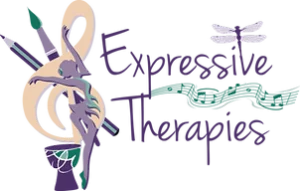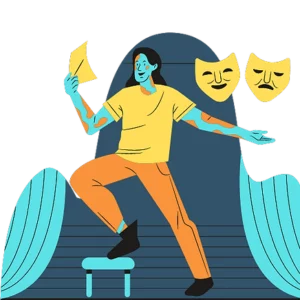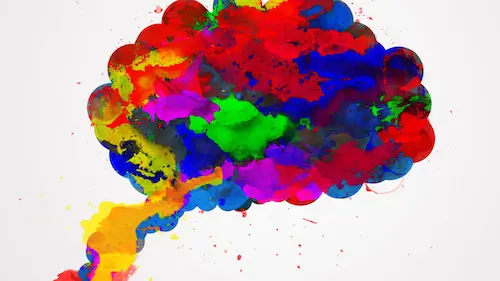If you’re looking for a way to heal your mind and soul, look no further than expressive therapy. This type of therapy uses art to help people communicate their thoughts and feelings. It can be an incredibly effective way to deal with stress, anxiety, and other emotional issues. In this blog post, we will discuss the benefits of expressive therapy and how it can help you achieve mental and emotional health!
Contents
Defining Expressive Therapy

Expressive therapy is a form of psychotherapy that uses art to help people express their thoughts and feelings. It can be used to deal with a wide range of mental and emotional issues, including stress, anxiety, depression, trauma, and more. The goal of expressive therapy is to help people explore their emotions and create a sense of understanding and peace.
Expressive therapy is not only about communicating through art – it is about the process of creating art itself. Creating art can be a very therapeutic experience. It can help you to express your emotions in a safe and non-threatening way. The act of creating art can also help you to develop a greater understanding of yourself and your emotions. Moreover, it can provide you with an outlet for stress, anxiety, and other negative emotions. If you’re looking for a way to heal your mind and soul, consider giving expressive therapy a try! You may be surprised by how much it can help you!
Types And Techniques
There are many different types of expressive therapy. Some common approaches include:
Art therapy
This form of therapy works by helping people to express their emotions through art. This can consist of painting, drawing, sculpture, and other forms of art. It works by giving people a safe and non-threatening way to express their emotions.
Art therapy can be an incredibly effective way to deal with stress, anxiety, depression, trauma, and more. It can also help you to develop a greater understanding of yourself and your emotions. Some of the most commonly practiced techniques in art therapy include:

- Drawing
- Painting
- Sculpturing
- Sketching
- Doodling
- Photography
- Coloring
- Collage making
- Tattooing
- Clay sculpting
- Scrap-booking
- Card making
- Portrait making
- Abstract Painting
- Mandala Making
Music therapy
This form of therapy works by helping people to express their emotions through music. This can consist of playing an instrument, singing, songwriting, and more. It can also proceed by giving people a safe and non-threatening way to express their emotions.
This approach works by utilizing music’s emotional power to help people heal. It can be an incredibly effective way to deal with stressors and also help you to develop a better sense of self. Most common practices under this type of therapy include:

- Listening to music
- Playing an instrument
- Singing
- Songwriting
- Composing music
- Jamming with others
- Guided meditation
- Sound healing
- Musical meditation
Drama therapy
This type of therapy uses drama and theater to help people express their thoughts and feelings. Drama therapy works by helping people to express their emotions through drama and theater. This can include acting, improvisation, storytelling, and other forms of drama. It works by giving people a safe and non-threatening way to express their emotions.
This form of expression can also involve props, costumes, and set design. Drama therapy can be an incredibly effective way to deal with stress, anxiety, depression, trauma, and more. It can also help you to develop a greater understanding of yourself and your emotions.
Some of the most commonly practiced techniques in drama therapy include:

- Acting
- Improvisation
- Storytelling
- Puppetry
- Mimicry
- Puppetry
- Mask work
- Role-playing games
- Skits and plays
- Lip-syncing
- Mime
- Comedy and stand-up comedy
Dance/movement therapy
This form of therapy works by helping people to express their emotions through movement. This can consist of dance, yoga, Tai Chi, and other forms of movement. It also proceeds by giving people a safe and non-threatening way to express their emotions. It can also have the added benefit of helping people to get some physical activity, which has its own host of benefits.
Dance/movement therapy can be an incredibly effective way to deal with stress, anxiety, depression, trauma, and more. It can also help you to develop a greater understanding of yourself and your emotions.

Some techniques and ways by which this form of therapy is practiced include activities such as:
- Dancing and its various forms
- Yoga
- Tai Chi
- Brisk walking
- Running
- Hiking
- Outdoor sports
- Swimming
- Zumba
- Aerobics
- Martial Arts
- Pilates
Writing therapy
This type of therapy uses writing to help people express their thoughts and feelings. Writing therapy works by helping people to express their emotions through writing. This can include journaling, creative writing, letter-writing, and other forms of writing. It works by giving people a safe and non-threatening way to express their emotions.
The act of writing can also help you to develop a greater understanding of yourself and your emotions. Moreover, it can provide you with an outlet for stress, anxiety, and other negative emotions.
Most commonly and frequently used forms of activities in writing therapy include:

- Journaling
- Creative writing
- Letter writing
- Poetry
- Script writing
- Blogging
- Essay writing
- Fiction writing
- Autobiographical writing
- List making
As you can see, there are many different types and techniques that can be used in expressive therapy. The type of technique that is used will depend on the type of therapy that is being used. However, all of these techniques share the common goal of helping people to express their thoughts and feelings in a safe and non-threatening way. If you’re looking for a way to improve your mental and emotional health, consider giving expressive therapy a try! Each therapist will use different techniques based on their own training and experience.
Benefits
Expressive therapy can have a number of benefits for both the mind and the soul. Some of the most common benefits include:
- Reduced stress and anxiety: Expressive therapy can be a great way to deal with stress and anxiety. The act of creating art can help you to express your emotions in a safe and non-threatening way. This can lead to reduced levels of stress and anxiety.
- Improved mental health: Expressive therapy can also help to improve your overall mental health. The act of creating art can help you to develop a greater understanding of yourself and your emotions. This can lead to improved mental health overall.
- Greater sense of peace: Expressive therapy can also help you to achieve a greater sense of peace. The act of creating art can help you to explore your emotions and create a sense of understanding and peace.
- Increasing self-awareness: Expressive therapy can also help to increase your self-awareness. The act of creating art can help you to develop a greater understanding of yourself and your emotions. This can lead to increased self-awareness overall.
- Promoting creativity: Expressive therapy can also help to promote creativity. The act of creating art can help you to express your emotions in a creative way. This can lead to increased creativity overall.
- Fostering emotional insight: Expressive therapy can also help to foster emotional insight. The act of creating art can help you to develop a greater understanding of yourself and your emotions. This can lead to increased emotional insight overall.
- Enhancing social skills: Expressive therapy can also help to enhance social skills. The act of creating art can help you to interact with others in a positive way. This can lead to enhanced social skills overall.
As you can see, there are many benefits of expressive therapy. If you’re looking for a way to heal your mind and soul, consider giving it a try! You may be surprised by how much it can help you!
For People With Mental Disorders

Expressive therapy can also be helpful for people with mental disorders. Some of the most common mental disorders that can be helped by expressive therapy include:
- Anxiety disorders
- Depression
- Chronic stress
- Eating disorders
- Post Traumatic Stress Disorder (PTSD)
- Attention Deficit Hyperactivity Disorder (ADHD)
- Obsessive-Compulsive Disorder (OCD)
- Developmental disorders
- Chronic illnesses
In addition, this approach is also of a big help for people with emotional problems, such as:
- Anger
- Grief
- Guilt
- Loneliness
- Low self-esteem
- Body image issues
- Conflict resolution
- Relationship issues
- Trouble being expressive
Expressive therapy can help people with mental disorders in a number of ways. The act of creating art can help you to express your emotions in a safe and non-threatening way. This can nurture a positive and safe space for the release of true emotions.
Drawbacks
Of course, expressive therapy is not perfect and there are some drawbacks to be aware of. These include:
- The risk of re-traumatization: One of the main risks of expressive therapy is that it can lead to re-traumatization. This means that you may revisit past traumas during the expressive process. However, this risk can be minimized by working with a trained therapist who can help you to stay safe and healthy during the process.
- It may not be right for everyone: Expressive therapy may not be right for everyone. Some people may find it difficult or impossible to express themselves through art. If this is the case, you may want to consider another type of therapy instead.
- It can be expensive: Expressive therapy can also be expensive. If you decide to seek out this type of therapy, you will likely need to pay for supplies and materials. You may also need to pay for the services of a trained therapist.
Overall, expressive therapy is a great way to heal your mind and soul. If you’re looking for a way to improve your mental health, consider giving it a try! However, it’s important to keep in mind that this type of therapy may not be right for everyone. If you think that expressive therapy might not be right for you, consider talking to your doctor or therapist about other options. They can help you find the best treatment plan for your needs.
How To Get Started With Expressive Therapy
If you’re interested in trying expressive therapy, there are a few things you need to do to get started. Here are a few tips to help you get started:
- Find an experienced therapist: It’s important to find a therapist who is experienced in expressive therapy. This will ensure that you get the most out of your sessions.
- Choose the right type of therapy: There are many different types of expressive therapy. It’s important to choose the right one for you. Consider what type of art you want to create and what issue you’re hoping to address.
- Create some art: The final step is to actually create some art! This can be anything from painting to sculpture to music. Just let your creativity flow and see what comes out!
If you’re interested in trying expressive therapy, follow these steps to get started. You may be surprised by how much it can help you!
Finding The Right Therapist
If you’re considering expressive therapy, it’s important to find the right therapist. While choosing a therapist, it is essential to keep the following points in mind:
- Start by collecting a database of potential therapists. You may ask for recommendations from friends or family, or you can search for therapists online.
- After you have a few potential candidates, schedule a consultation call. During this interaction, you can ask the therapist questions about their experience, approach, and fees.
- It is also important to make sure that you feel comfortable with the therapist. This is a very personal decision, so trust your gut!
Once you’ve considered these points, you’ll be well on your way to finding the right therapist for you! The right therapist will make all the difference in your experience!
Things To Consider

Before you begin expressive therapy, there are a few factors you should keep in mind. These include:
- The type of art you want to create: There are many different types of art, so it’s important to choose the one that’s right for you.
- What issue you’re hoping to address: Be sure to discuss your goals for therapy with your therapist. This will help them tailor the sessions to meet your needs.
- Your budget: Expressive therapy can be expensive, so be sure to consider your budget when choosing a therapist.
- Time and commitment: Expressive therapy can take some time to see results. It’s important to be patient and to commit to the process.
- Mode of treatment: If you have a busy schedule, you may want to consider online therapy. This can be a great way to get the help you need without having to leave your home.
These are just a few things to keep in mind before beginning expressive therapy. If you have any concerns, be sure to discuss them with your therapist. They can help you decide if this type of therapy is right for you.
Conclusion
In conclusion, expressive therapy is a great way to improve your mental health. It involves using art to express yourself and can be very therapeutic. If you’re considering this type of therapy, be sure to find the right therapist and keep your goals in mind. With a little time and commitment, expressive therapy can help you heal your mind and soul!
If you are searching for a place to start with mental health treatment with a preference for expressive therapy or any other approaches, consider Mantra Care! We have a team of highly professional mental health experts offering a variety of therapeutic services. Our therapy sessions are available globally through virtual mode with fully ensured confidentiality and efficacy. Reach out today to book a session or download our free Android or iOS app for more information!


